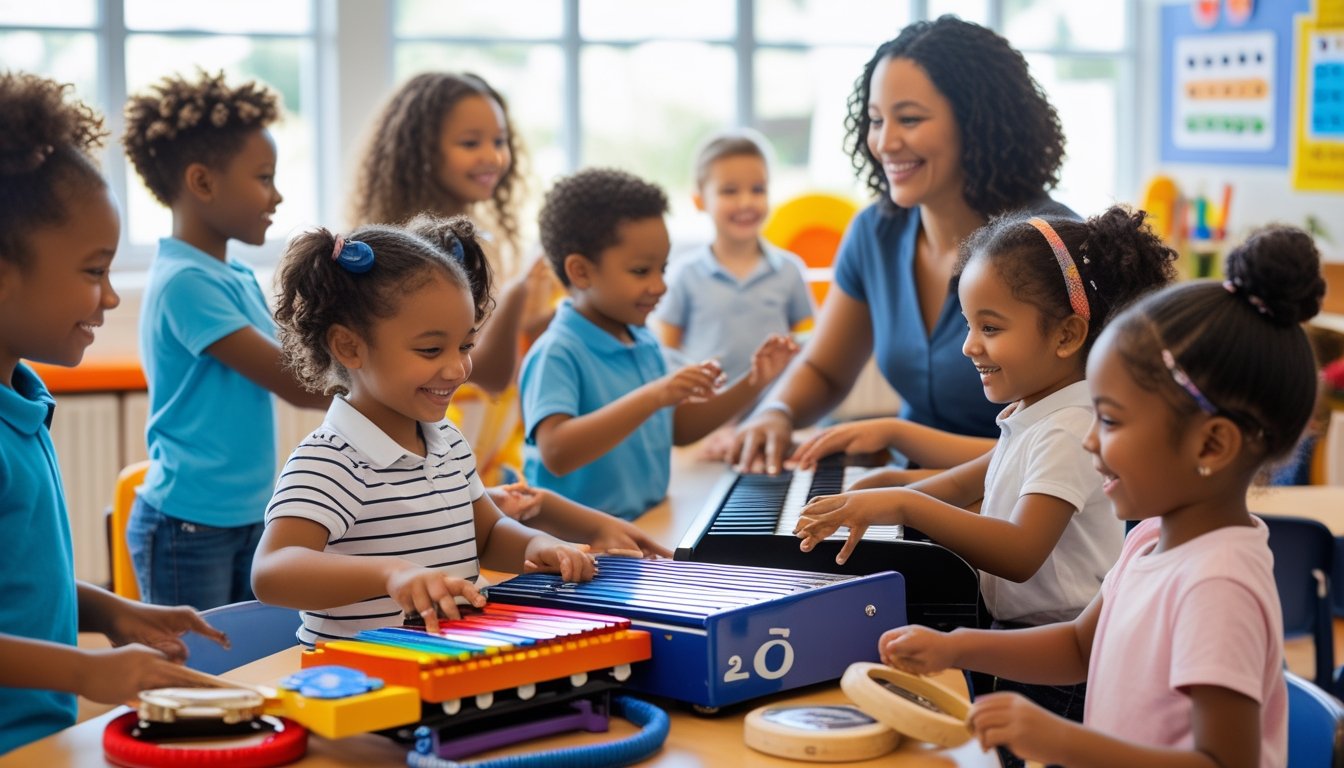Late updated: 14 Jul 2025 18:07
Written by:
Benefits Of Music Education For Child Development: Enhancing Cognitive and Emotional Growth
Music education isn't just about learning to play an instrument or memorising notes. It's a vital component of a child's development that offers numerous benefits across cognitive, emotional, and social domains. Engaging with music from a young age can significantly enhance a child's ability in areas such as language development, literacy, and even numeracy. By integrating music into everyday activities, we can support children's growing minds and equip them with essential skills for their future.

Beyond academic enhancement, music education plays a crucial role in fostering emotional intelligence. Children learn to express themselves, understand emotions, and build social skills through musical interactions. These experiences not only boost confidence but also promote empathy and communication abilities. Parents and educators have the unique opportunity to harness these benefits by making music a regular part of children's lives, encouraging creativity and enjoyment.
As we explore the wide-ranging advantages of music education, it's essential to consider its implementation and accessibility. Ensuring that music programmes are available and inclusive can make a lasting impact on child development. Through a well-rounded and engaging music education, children can develop essential skills that go beyond musical proficiency and enrich their lives in multiple dimensions.
Key Takeaways
- Music education enhances cognitive and social skills.
- Emotional intelligence and creativity benefit greatly from music.
- Accessible music programmes are vital for child development.
Core Benefits of Music Education for Child Development
Music education plays a crucial role in a child's development. It fosters multiple areas of growth, from cognitive abilities and academic success to social skills and personal confidence. Furthermore, it enhances creativity, emotional intelligence, and emotional well-being.
Cognitive Growth and Academic Performance
Engaging with music can significantly enhance cognitive development in children. Music lessons often require students to read sheet music, memorise pieces, and understand the structure of compositions. This practice improves memory and attention span. Furthermore, understanding rhythm and melody can aid in learning mathematical concepts, as both require recognising patterns and sequences.
Research suggests that children who participate in music education tend to achieve higher grades and perform well in academic tests. By fostering these cognitive skills, music education not only supports academic growth but also promotes a love for learning.
Social Skills and Confidence Building
Participating in music groups or ensembles cultivates essential social skills. Children learn to listen, share, and collaborate harmoniously with peers. This creates opportunities for building friendships through shared musical interests.
Furthermore, performing music in front of an audience can significantly boost self-confidence. As children gain proficiency in their musical abilities, they often feel a sense of accomplishment and pride. This confidence can extend into other areas of their lives, allowing them to tackle new challenges more effectively.
Creativity and Emotional Well-Being
Music is a potent medium for expressing and fostering creativity. Children exposed to music are often more open to experimenting with new ideas and thinking outside the box. This exploration nurtures their creativity and innovation.
Moreover, music can have a significant impact on emotional well-being. The ability to express emotions through music can be therapeutic and comforting. It helps children develop emotional intelligence by recognising and conveying emotions, both their own and those of others. This emotional connection through music promotes well-rounded and resilient individuals who can adapt to life's challenges.
Significance and Implementation of Music Education Programmes

Music education programmes are pivotal for nurturing children's intellectual and emotional growth. They play a critical role in developing cognitive skills and fostering creativity. Through different types of music education, we can tailor experiences to benefit children at various stages of their development.
Importance of Early Music Education
Early music education is crucial for laying a strong foundation in a child's development. Engaging children with music during their formative years enhances their brain development and language skills. Research suggests that exposure to music improves memory, literacy, and numeracy, providing a robust groundwork for future learning.
Incorporating music education in early childhood settings helps in forming important social skills. Children learn to communicate and work collaboratively. Simple activities like singing and rhythm exercises enhance their concentration and listening skills. By introducing music early, we offer children a unique way to express themselves and explore their creativity.
Types of Music Education Programmes
There is a wide variety of music education programmes available that cater to different interests and age groups. School-based programmes integrate music classes through which students learn about various instruments and musical theories. These programmes often include structured curriculums designed to align with educational standards and foster a comprehensive musical understanding.
Extracurricular programmes provide focused opportunities outside regular school hours. These include private music lessons, community choirs, and orchestras. Such options allow children to dive deeper into specific areas of interest. Programmes like these encourage engagement with local music communities and expose children to diverse musical experiences and performances.
Technology-based programmes utilise digital tools to enhance music learning. With the rise of online platforms and software, children can now access innovative music education resources at any time. This flexibility aids in personalised learning experiences, making it easier for them to understand music theory and practice new skills.
Supporting Your Child's Musical Journey
Parents and caregivers play a vital role in fostering a child's musical journey. Encouraging regular practice and showing interest in their musical activities can make a significant difference. Creating a conducive environment for musical exploration at home is beneficial.
By attending concerts and music events together, we can inspire a child's love for music. Furthermore, involving them in discussions about different musical genres and providing opportunities for them to express their musical tastes enrich their experiences. Our support and encouragement can be fundamental in sustaining their interest and helping them gain confidence in their musical abilities.
Frequently Asked Questions

Music education greatly impacts children, enhancing cognitive development, social skills, emotional well-being, academic performance, creativity, and discipline. These attributes collectively contribute to their holistic growth and success.
How does music education contribute to a child's cognitive development?
Music education stimulates various areas of the brain, promoting enhanced cognitive functions. It helps improve memory, attention, and language skills. Engaging in music-related activities enhances brain plasticity, which is crucial for rapid learning and skill acquisition, especially in younger children.
What social benefits can children gain from engaging in music education?
Participating in music education fosters teamwork and collaboration. Children often engage in group activities that require coordination and cooperation, enhancing their social skills. Music also helps break down cultural barriers, promoting inclusivity and understanding amongst peers.
In what ways does music education in early childhood impact emotional well-being?
Early engagement with music promotes emotional expression and regulation. Children learn to express their emotions through music, which fosters a healthy emotional outlet. This experience helps them develop empathy and emotional intelligence, aiding them in navigating social relationships.
Are there measurable academic benefits for students who participate in music education?
Students involved in music education often exhibit stronger academic performances. Music training is linked to improved skills in mathematics, reading, and critical thinking. Studies suggest that students with regular music training tend to score higher in standardised tests.
How does music education influence a child's creativity and problem-solving skills?
Music encourages children to think outside the box and explore new ideas. It involves improvisation and composition, nurturing creativity. Engaging with different musical elements and structures helps develop problem-solving skills, as children learn to identify patterns and find creative solutions.
What role does music education play in developing a child's discipline and perseverance?
Music education requires consistent practice and dedication. Learning an instrument or piece of music teaches children discipline and time management. It involves setting goals and working diligently to achieve them, instilling perseverance and resilience in young learners.
